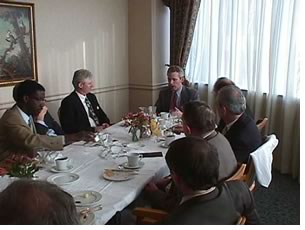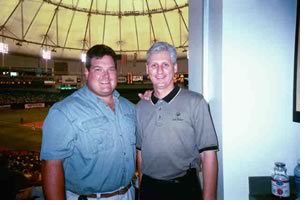

03/2005
AIA Tampa Bay forging lasting relationships with representatives

by Heather Livingston
For most of the last decade, AIA Tampa Bay members have been making a profound difference in their community by reaching out to state legislators in an informal, yet engaging way. Started by Mickey Jacob, AIA, currently president of AIA Florida, and Henry Woodroffe, FAIA, president, Woodroffe Architectural Corporation, the chapter’s periodic “Breakfast of Champions” brings together architects and legislators to discuss what’s going on in the city and how architects can help shape their communities by providing counsel, expertise, and, yes—contributions.
The chapter created the program to help its members get more engaged in the political process and involves both the state and local components. “It’s hard to get people up to Tallahassee or Washington to meet with our legislators, so we came up with the concept of this breakfast,” says Jacob. “It’s been a hugely successful program and continues to perpetuate itself.”
 The set-up
The set-up
Here’s how it works. The chapter invites a legislator to breakfast,
typically a representative in the state house or senate but sometimes
a U.S. congressperson. AIA Tampa Bay also invites about a dozen architects
from the district, each bringing a minimum contribution of $100, to
attend the breakfast at a local gathering place.
“We have a legislator to ourselves for about an hour and a half,” says Jacob. “It’s a wonderful time. It’s very informal. We discuss issues. They’re always interested in what we’re doing and what our issues are. It’s a great opportunity for everybody and an informal way to get to know our legislators and get the name recognition so that when we do go up to either Tallahassee or Washington, we can be recognized and go in there and have personal contact with them.”
The chapter works hard to get a variety of members involved in the program so it’s not always the same faces making the same pitch. At times, depending on the legislator, the chapter will try to match the architects to the party, but typically the group is bipartisan. “We’re more interested in just getting in front of a legislator and getting the architects there so we engage in the process a little more,” notes Jacob. “What we do is encourage people to do these all over the state, because it’s really important that our members get to know their legislators. The personal contact is something that we as architects need to do more. We need to be more engaged in the growth management and legislative processes, because they affect us every day. The more familiarity we get with that and the higher the comfort level, the better served we’ll be as a group, especially through the AIA.”
In the hands of members
In addition to the contributions the architects bring to the breakfast,
the component requests a matching check from the state PAC program,
FAPAC. If the FAPAC board approves the request, they cut a check
for $250 or $500, depending on the legislator. That check is then
given to the legislator along with the individual checks the morning
of the breakfast, further reinforcing that both the offer of support
and campaign contribution are from the architects in the community.
“It’s key that we get the FAPAC check in the hands of the members delivering it directly to the legislator, preferably back in the district,” Jacob believes. “I think that’s the element that makes this program work so well. We’re not going up to Tallahassee doing this. We’re doing it back home, in the district, getting people from the district engaged. It’s not a lobbyist handing over the check, it’s our members who live in that legislative district doing it. And that carries, in my opinion, a heck of a lot more weight than any other way we distribute PAC funds or communicate with the legislators.”
The program has become so well-known that legislators occasionally will ask the chapter to host a “Breakfast of Champions” for them. Although the breakfasts typically are held for members of the state legislature, they will occasionally offer one for members of the U.S. Congress. Jacob notes that for these, members tend to bring a personal contribution of $200-$250. In addition, the component has recently begun inviting people outside the AIA to participate as well, including contractors and engineers. “At the last breakfast we held, I think we had 19 people, each bringing a check of $100 plus a FAPAC check for the legislator,” says Jacob. “Representative [Bob] Henriquez [D-Fla. 58th district] was very happy about that.”
 The payback
The payback
Thanks to the strong relationships the Tampa Bay AIA architects have
forged with their legislators, they now have a network of advocates
in the state legislature. According to Jacob, the state is currently
considering a bill that will significantly affect the Practice Act,
and AIA Florida is hoping that their efforts over the years will “pay
big dividends.” March 16 is AIA Florida Legislative Day in
Tallahassee. “We’re going to be calling on all of our
friends in the state legislature who’ve attended these ‘Breakfasts
of Champions’ to help support and cosponsor the bill,” he
said.
Apart from the successes they’ve had in gaining support and cosponsors for legislation, possibly even more significant is that legislators will now reach out to the design profession through the chapters with requests for information from architects on issues important to the community. At the AIA Florida Board meeting in January, Rep. Henriquez, a planner by trade, spoke to the board members and encouraged a still higher level of interaction with local government. According to Jacob, Henriquez voiced concern that growth management is increasingly a critical issue in Florida, yet architects are not engaged in the process as they should be. He thanked the architects for their years of support and called upon them to help once more—this time with expertise and involvement in the process. “He was great. He’s a funny guy,” said Jacob. “But he was very strong in his words in terms of the message that he brought to us that architects really are the key.”
Dos and don’ts
When setting up a program like “Breakfast of Champions,” Jacob
suggests that you first contact your state chapter to determine the
laws for political giving, since they are complex and subject to change.
As an example, in Florida, representatives in the state legislature
can accept corporate checks (federal representatives can accept only
personal checks) but cannot receive any contribution when the legislature
is in session. Other suggestions of note:
- Make sure you schedule the meeting with the legislator
- Have a direct point of contact to your legislator
- Show up early for the meeting
- Bring a camera, take photographs
- Put a photo in your components’ newsletters, especially if there’s PAC money involved.
Lastly, Jacob suggests that you relax, have fun with it, and remember that the substantial expertise that architects bring is beneficial to their representatives and community. Tampa Bay has realized that many members embrace the concept because it’s engaging, yet simple to do. “It’s not a whole lot of time, and the legislators love it,” says Jacob. “Because of the way we’ve done it—the informalness of it—the legislators really enjoy the ‘Breakfast of Champions’ because you’re just having a cup of coffee, eating some scrambled eggs, and chit-chatting. And everybody gets a chance to engage in the conversation. It’s really kind of neat.”
Copyright 2005 The American Institute of Architects.
All rights reserved. Home Page ![]()
![]()
 |
||
Photos
courtesy of AIA Tampa Bay and AIA Florida.
|
||